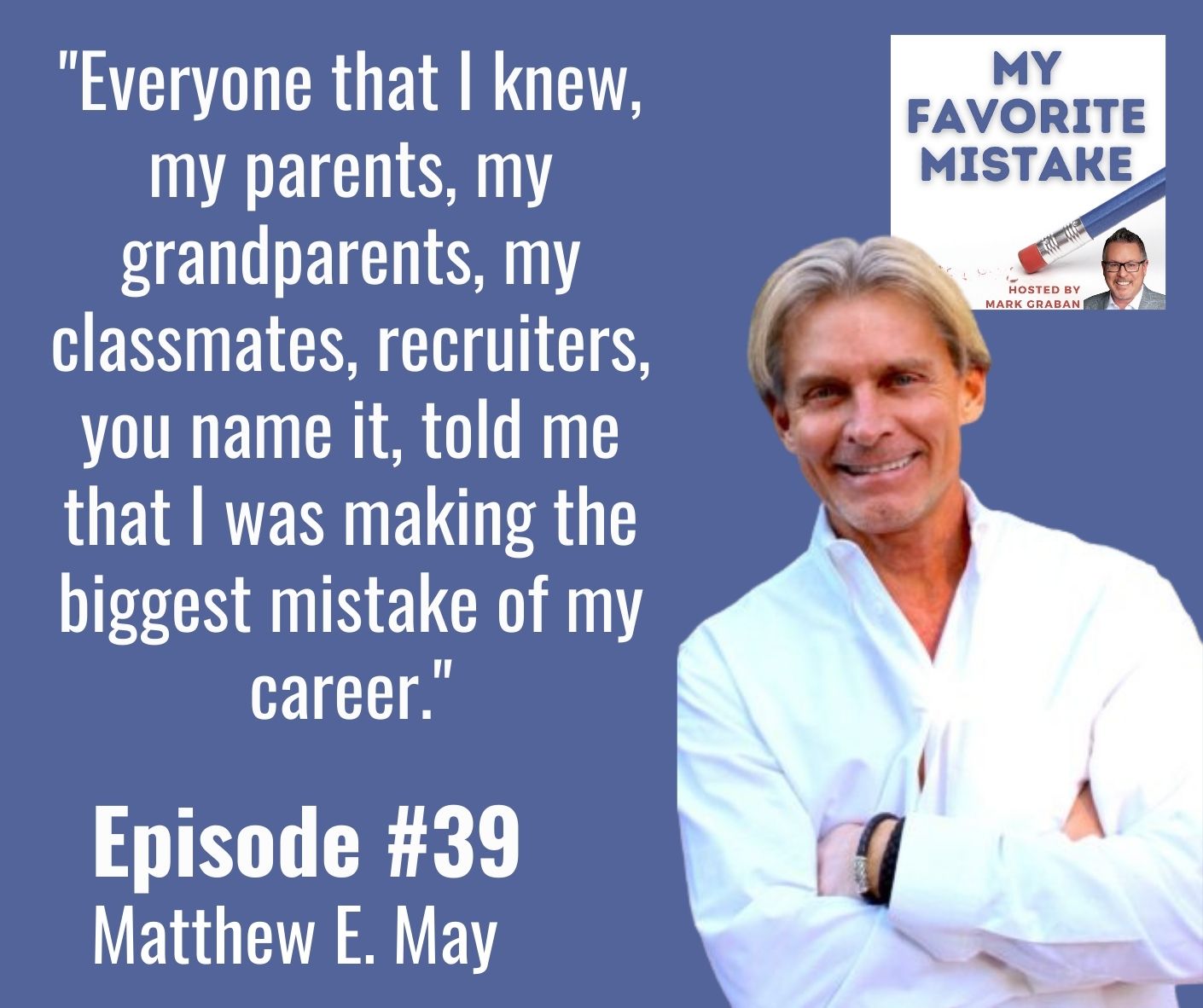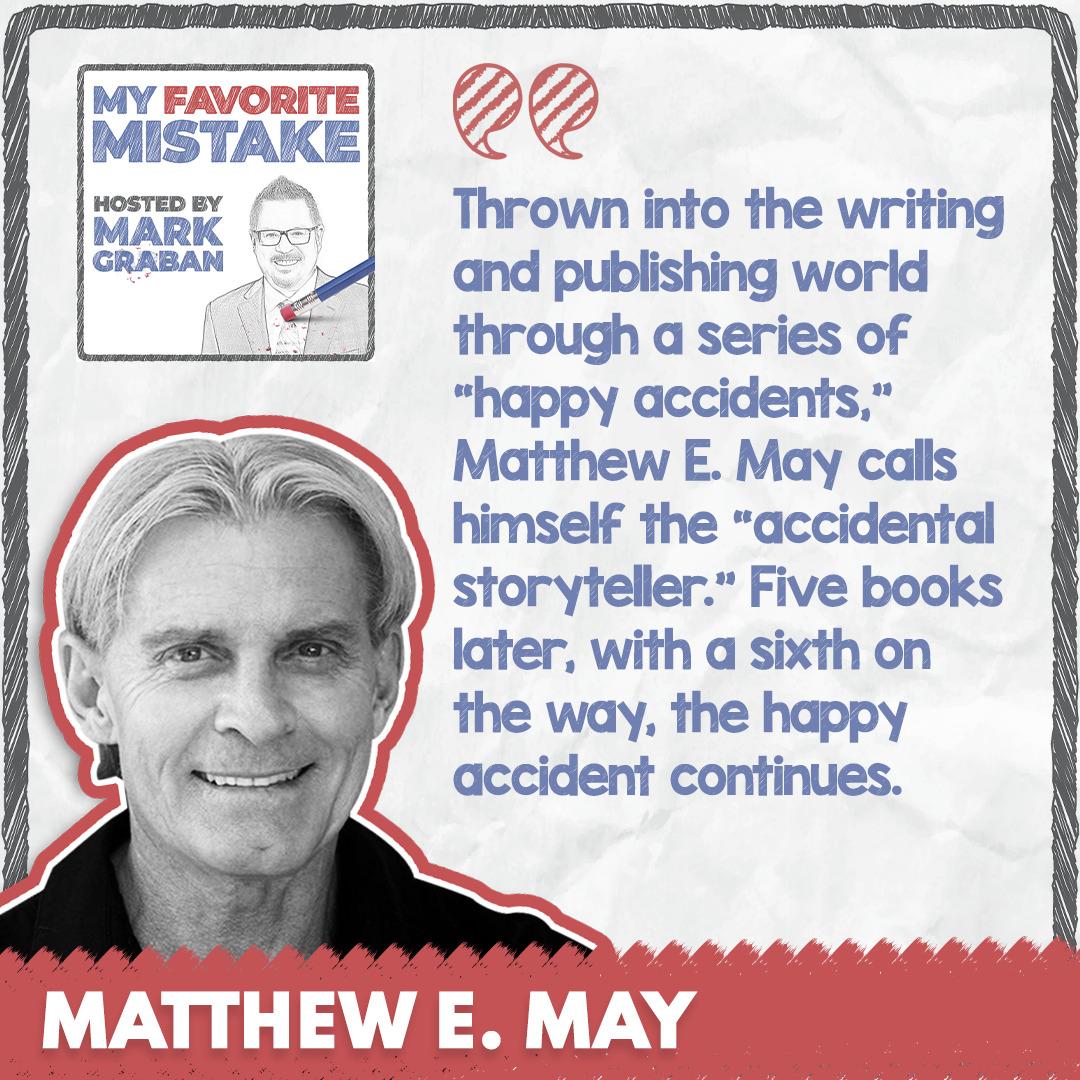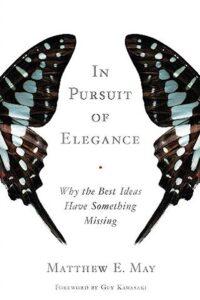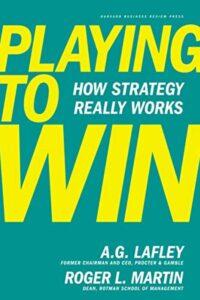Listen:
Check out all episodes on the My Favorite Mistake main page.
My guest for Episode #39 of “the My Favorite Mistake” podcast is my friend Matt May, a multi-best-selling author and he's Chief Strategist with his firm Stratechia.
I've known Matt for a long time as a former University of Toyota educator, a Wharton graduate, and an amazing author. I've interviewed him many times before. I didn't know that he was formerly a theatre and television actor (including a stint on a soap opera — I don't have video clips of that).

Today, We Talk About A Few Of His Favorite Mistakes:
- Not taking the traditional high-paying job after completing his MBA
- Leaving New York City for Los Angeles in the pursuit of his acting career
Matt and I also talk about mistakes more generally — when are they “happy mistakes?” Were there any acting gigs that were mistakes? How should we think about mistakes, as individuals and as organizations?
Update March 2023 — Matt has co-authored a new book, What a Unicorn Knows: How Leading Entrepreneurs Use Lean Principles to Drive Sustainable Growth available now — Watch my interview with him and Pablo Dominguez here via my Lean podcast.
You can listen to or watch the episode below. A transcript also follows lower on this page. Please subscribe, rate, and review via Apple Podcasts or Podchaser! This podcast is part of the Lean Communicators network.
Watch the Full Episode:
Quotes:

!["In the [Toyota] sales and marketing world, there wasn't that embrace of failure. The old 'fail fast and learn' mentality was not there."](https://www.markgraban.com/wp-content/uploads/2021/02/Matthew-May-My-Favorite-Mistake-2.jpg)
Subscribe, Follow, Support, Rate, and Review!
Please follow, rate, and review via Apple Podcasts or Podchaser or your favorite app — that helps others find this content and you'll be sure to get future episodes as they are released weekly. You can also become a financial supporter of the show through Anchor.fm.
You can now sign up to get new episodes via email, to make sure you don't miss an episode.
This podcast is part of the Lean Communicators network.

Other Ways to Subscribe or Follow — Apps & Email
Pursuing An Acting Career After His MBA: Matthew E. May

My guest for Episode 39 is Matthew E. May, best-selling author and Chief Strategist with his firm, Stratechia.
—
In this episode, we're joined by Matt May. He is a recognized thought leader in business strategy, human-centered innovation, and Lean operations. He's influenced by nearly a decade spent as a full-time advisor to Toyota, and he is the author of five books that I've enjoyed. They include the bestselling The Elegant Solution, The Laws of Subtraction, and Winning the Brain Game. He's had articles in publications like The New York Times, HBR, and Fast Company. He has an MBA from Wharton. Matt is the Founder of Stratechia, a Los Angeles-based strategy and innovation firm. With that, Matt, welcome to the show. How are you?
I'm doing good. Thank you.
We'll dive right in. I'm sure you've got a good story for us. What is your favorite mistake?
My favorite mistake or best mistake is the one that you just mentioned. I have an MBA from Wharton. It’s a pretty prestigious business school. I am always up there in the top five or so. I graduated in the mid-'80s. Of the 750 or so graduates of my class, I was the only one to reject one of those nice high-paying salaries that everyone else took.
At the time, two industries were probably the hottest. One was investment banking, and the other was management consulting. I worked my summer job between the two years of business school in the strategy department of a large pharmaceutical company. Being a wise and wizened 25-year-old, I knew that I would die a slow and horrible death trying to claw and scratch my way to the middle. Come graduation, I rejected all offers. I headed to New York with only an inkling of what I wanted to do other than become an actor.
Everyone that I knew, my parents, my grandparents, my classmates, and recruiters, you name it, told me that I was making the biggest mistake of my career if not life. First of all, getting into Wharton was no easy feat. Also, completing the program. “Why would you spend all that time and money going through two years? What's going through your brain? Should we check you in somewhere?” That's my favorite mistake, and we can unwrap that a bit to just the beginning of the story and how I got from there to here if you want. I'm going to leave it up to you.
[bctt tweet=”Everyone that I knew – my parents, my grandparents, my classmates, recruiters, you name it – told me that I was making the biggest mistake of my career.” via=”no”]
Did you feel like it was a mistake at the moment or at any point? From the people's outside judgment, it seemed like a mistake. You were following a path that you were interested in.
You can only identify mistakes retrospectively unless I missed my guess. We all go into things not thinking that we're making mistakes. I had doubts, because when you've got smart and influential people, all the world is moving left, and you want to go right, you think, “Maybe they're right. Maybe it's not too late. Maybe I should pick up the phone, ‘I changed my mind.’” I don't know that I thought it was a mistake, but I sure did have doubts.
I remember a mention of you doing some acting. I won't even call it a mistake, but that unconventional path, at least that first step out of Wharton, how did pursuing acting then lead to advising with Toyota? I assume you weren't giving acting lessons to Toyota executives.
Like many of the things in my life, it's probably a series of happy mistakes if you look backwards at it. I'd love to tell you I've made grand strategies and plans, but almost everything that has happened that's of a good thing in retrospect has been a happy accident. When I moved to New York City, I only had a few dollars in my pocket. I had enough probably for three months of living there in the summertime. I thought, “If it doesn't work for these three months and I can't get something going, I do have an MBA from Wharton and I will fall back on it.”
At the same time, I recognized a couple of opportunities. One of them was to start my own educational consulting practice as a way to feed my foray into theater. What do I mean by that? In my second year of graduate school, as part of a work-study and financial assistance program, I worked in the Office of Admissions. My job was to interview waitlisted candidates.
If you don't know anything about getting into a business school back then, it's a little different than it is now. Back then, you had to take a GMAT and a score, but what they wanted was two years of experience beyond college. You didn't leave college and go to a top-ten business school. It just wasn't done. There was a fairly healthy waiting list of candidates and an understanding of what then was behind the application process, the admissions process, and what the admissions committee was looking for.

It was my job to read the dozen or so essays. I thought that I'm in New York City. There are a host of investment banks that have these two-year analyst programs where they send their best and brightest to the best business schools. They come back at a higher level, but that's dependent on them getting into one of those great business schools.
Having that insight, I approached all of those associate junior analyst programs in the training and education department of Salomon Brothers, Merrill Lynch, the Lehman Brothers, and all the names. They have merged now. I said, “I will help your folks that you're sending off to business school complete their applications as an advisor. I'm not going to write their essays for you, but I can lend my insight into what makes a good essay.”
That was how I made money that allowed me to pursue acting on the side. I did spend some time on TV, in commercials, and in theater until I moved out here to the West Coast. It allowed me to write a book. It's a little-known book. I had a print, but in 1990, a book called the Admissions Guide to Selective Business Schools came out. I had been one of those lucky folks that had gotten into the Harvards, Stanfords, and Whartons of the world.
I had both sides, the writing side, and the review side, and that's how things began. I sold that to an educational company. I was also teaching at Stanley Kaplan's GMATs in the evening to support myself and moved out here to the coast again with no plan in mind. We can pick up on that, but if you had a question on that path, that's how New York City worked out.
You were able to pursue that path. You were getting by. Is that the right phrase to use from these side gigs? You were happy and at that point, it didn't feel like a mistake to you.
No. I wasn’t waiting tables. I wasn't starving. I wasn't bartending. It allowed me to have my own schedule. I could go on calls when I needed to. I met mostly in the evenings with these candidates. I made a trip out here to the West Coast on the 4th of July in 1989. I decided I'd better move out here because I had just sold the practice and the book. What better time? It seemed like a turning point. I flew back to New York City. I packed out my apartment. I drove out here within a week and started all over.
The first thing I did was connect with my Wharton alumni network. I met up with a company and a gentleman by the name of Dave Power, the J.D. Power and Associates’ Founder. That was my foray into the automotive industry. I freelanced my MBA here on the West Coast with J.D. Power and Associates with a number of performance improvement consulting companies, Maritz, and other big, huge companies that serve the automotive industry until 1998 when I got a weird phone call from Toyota.
That wasn't a mistake on their part. They meant to call you. It was that different happy mistake. You take that call when it comes in, right?
Yeah. I knew the gentleman. I had been working under someone else's banner with Toyota at the University of Toyota, which was a newly formed entity I was about to find out. It was before Christmas. The phone call went something like this. “Mr. May, my name is so-and-so. I am the newly appointed Dean of the Associate College of Education at the University of Toyota. I'm 1/2 of the two-part university. We are getting together after the New Year in a three-day offsite to figure out what we want to be, but this is a strategic initiative on the Toyota motor sales part.”
“It's one of a seven-pronged strategy to move into the new era. We want to figure out what we want to be when we grow up at a corporate university. We've made rounds and studied the best like Crotonville, Disney, etc. but we're not sure what we're all about. We were looking for the best possible facilitator we can find. Unfortunately, he's not available. We heard you might be.” That was the happy accident that began a long run of over eight years.
In your teaching and advising at Toyota, I know you learned a lot from that experience. Toyota is well-known for the Toyota production system and approach to management that's often copied. I don't know how well emulated it is, but there are attempts to copy it. I'm wondering, what are your recollections about Toyota's mindset around mistakes as much as you can generalize? One of the themes here in the show is learning by making mistakes. When we try to improve by running experiments and trying new things, inevitably things don't work out and we could call those mistakes. I'm curious how that thought process might have worked at Toyota.
My experience is outside of the production environment, but the challenge was a weird challenge for me. The first challenge they gave me went something like this. “We need to figure out a way to bring the creativity that's found on the manufacturing side of our business into knowledge work.” At the time, at the end of the 1990s, if you were to count up all the A3s that had been printed and shared, there were probably upwards of 700,000 or 750,000 of those per year being generated. The lion's share of those were in the production environment, and that included not only factories, but logistics, warehouses, and places like that.
Can you do a quick verbal footnote for readers who might not be that familiar with Toyota? What is an A3 in a nutshell?
An A3 refers to paper size. Back in the day, an idea or a piece of communication or a strategy was fit on the biggest size of paper that would fit through a fax machine, and back then, that biggest size was the international paper size of an A3. It is now shorthand. I always ask people that use A3s in their companies, “Do you know what an A3 refers to?” No one knows, but in the world of Kaizen or continuous improvement, one form of an A3 is a story of a team. They're affectionately referred to in some places in Japan as Kaizen newspapers.

It's on one sheet of paper. There's an art to folding it, but it tells the story of a theme or a problem, what the conditions of that problem are, and what the analysis of the causes of that problem might be. What the alternatives in terms of concepts, solutions, and ideas might be to counter that problem and then a plan for experimenting with that solution, which lands us on the doorstep of mistakes.
The world of Kaizen and continuous improvement is alive and well in Toyota and other places following World War II. It was all about small nested experiments as close to the front line as you can. Before you went nationwide, company-wide, or department-wide on anything, you would ask the question, “What would've to be true for this to be a good solution on a broader scale?”
You would test out the weak parts of that solution. You get proof of concept, essentially. The difference between an experiment and a pilot would be trying to make sure this isn't a bad idea, rather than, “This is a great idea. How will it spread?” The weird project for me was how to get the creativity out of the factory and into the knowledge side.
In the United States, Toyota Motor Sales is one of a number of distributors of Toyota products that are made in the United States and everywhere else but they were the sales and marketing arm, the major one in the US. When I say knowledge, we are talking about sales, marketing, HR, legal, finance, and all of the things that are outside production.
I started my career in manufacturing as an engineer, and you'd think there would be a perception that people in “knowledge work” would be more creative than people in the factory. That would be a stereotype or maybe an incorrect perception but that would be a mistake to think that.
That's why I thought it was weird, because I'm like, “The guy's putting on a windshield wiper all day long. How creative is that?” Meanwhile, I got these guys doing projects in sales and marketing. They're doing these grand marketing campaigns and their one-off. Nothing's the same thing and they're project-based. Lo and behold, there was a fear of failure on the knowledge side of the business where that didn't exist on the production side of the business.
It was a hearty challenge, and it took several years. I've told you this story before, but there came a point midway in that 8 or 9-year run where I was ready to walk out the door because I was ready to throw up my hands in the air. I didn't know what to do until a couple of epiphanies happened. Back to your question, in the sales and marketing world, there wasn't that embrace of failure.
The old fail-fast-and-learn mentality was not there. My client, the dean of the university, saw that as an opportunity to carry out the mission of the University of Toyota, which was to spread and embolden the tenets, philosophies, methods, and practices that had brought Toyota and were bringing them to. They hadn't become the biggest yet, but certainly, it was the halo years of Toyota as an automaker. It was an interesting project to have.
[bctt tweet=”In the (Toyota) sales and marketing world, there wasn’t that embrace of failure. The old “fail fast and learn” mentality was not there.” via=”no”]
You also do a lot of strategy work. I'm curious. As a final topic to dig into here, when a company invents a new product line or pivots or goes in a new direction, as much as you can generalize what your perceptions are, how often is that planned versus a mistake? It's a discovery that couldn't be put into a five-year plan as, “Something along in year four, we're going to innovate and do this.”
That’s a loaded question because I had another happy accident happen to me that concerns strategy. I'll try and shortcut the story, but I hated strategy in business school and the way it was taught. It was left-brained. It was very, “Let's start with an analysis.” It’s SWOT, Strength, Weakness, Opportunity, and Threat. I didn't like that and strategy was synonymous with a plan or a document that told who was going to do what by when and with what resources.
That logical, well-reasoned, mathematically-determined, market research-driven plan.
I hated it. It wasn't creative to me. I have an underdeveloped left brain. I have an overdeveloped right brain. I didn't like it until I ran into a gentleman by the name of Roger Martin. We met each other many years ago when we had a book out at the same time. His was called The Design of Business. It was my second book. It was called In Pursuit of Elegance. Businessweek had recognized those books with a parcel of others as being worthy of mention for creativity and innovation in organizations.

We got to meet each other that way and maintain an arm’s length appreciation of each other. Obviously, mine is for him more than the other way. He's a brilliant guy. He helped run the Monitor Group. He was the Dean of the Rotman School at the University of Toronto. He taught me a new way of strategy. It's called Playing to Win. It’s what he used to advise Proctor & Gamble. That simple framework of, “What's your winning aspiration? Where will you play? How will you win? What capabilities do you need? What management systems are required? What would have to be true for those choices to be successful? How will you test out your assumptions?” was an epiphany for me on strategy.
From 2012 to now, I have had a completely different view of strategy than a plan. Plans are great. There's a place for them, but when you say strategy, to me, it's about the choices that you make and not necessarily the plans that you make. Plans may be explicit about those choices, but more often than not, they don't because they don't tell you the important part of strategy, which is the things that you choose not to do.
They imply them, but they're not explicit about it. When you ask me, “How many times? Is it an accident?” I don't know. I have been doing a great deal of work with venture-backed small companies and startups. More often than not, the work in the garage, no one has a plan. They're forced to create a plan to get venture backing. They have identified a problem. They believe they have an elegant solution for it, and they have a passion for bringing that solution to the world.
That more than anything, drives them and they're in a constant iterative mode until they get to the point where they need that maturity and discipline where someone's going to throw money their way. I get to see a lot of those companies, and it's super refreshing. Do they have a plan? Yes. Do they have a strategy? Usually not. Not in the way that I've come to define strategy.
If people want to learn more, they can google Roger Martin Playing to Win. It’s a good topic to dig into.
The book is called Playing to Win. There's a thing called Thinkers50.com that has the Top 50 Thinkers. He's always at the top. He's always got a podium position. He was number 1 a few years ago and maybe dropped down to number 3 or something like that. He is a brilliant guy. He got a new book coming out that you and I should probably talk about because he takes to task the whole notion of efficiency as the wrong way to go in Corporate America.

I wouldn't disagree with him. I would rather use words like effectiveness.
It's an interesting book. I'm not sure what to do with it. He's asked me to take a look at it and do something, but I'm not sure what. That's maybe my own biases being revealed.
We'll take a look at that again at some point when that book is out. It would be good to chat about that. As we wrap up here, I'm going to hit you with an oddball question here on mistakes. You mentioned acting. I'm going to try to hit you to get an honest answer. Any acting gigs that you took that were mistakes because you ended up hating the role or the project?
No, but I will tell you that the acting mistake that I did make was leaving New York City for the West Coast. This is off-topic, but since you asked, in New York City, there is more of an artistic intention or a purpose about acting. You go to acting classes a lot. You take dance classes. You take improv classes. You try and develop yourself as an artist. When I moved out here, and as you know, being a West Coaster, we're in the shadow of Hollywood and everyone wants to be famous. They don't care about the art of it.
I realized when I moved out here that I had probably made a mistake leaving New York City. I wasn't ready to do that. I ended up ditching my acting bent and habit within 3 or 4 months of moving out here and never looked back. Have I used that skill? Absolutely. I speak a lot. I facilitate a lot. Being in front of people and being raggedy sometimes in front of people doesn't daunt me.
You call me a West Coaster. This is still very new for me. What I see driving around LA is 90% of the billboards, at least, are about this new show, this new movie. It’s all, “Watch this. Vote for this and these awards.” That's my observation for being here. It’s not a mistake to move out here to LA so far by any means, even though clearly, I did not come out here to pursue acting or being famous.
There are enough starving actors out here.
Matt, this has been a lot of fun. Thank you for doing this and letting me put you on the spot to talk about mistakes. Our guest, again, has been Matt May. He's the Founder of Stratechia. Matt, what can people do if they want to learn more about the firm? Give us the website.
It's Stratechia.com. It’s a mashup of strategy and technology with an Italian flair. You can find me on LinkedIn as well. I write articles there and on Medium.com. Give me a search.
Matt, thanks again. We'll talk to you soon.
Thank you. Likewise.
Important Links
- Stratechia
- The Elegant Solution
- The Laws of Subtraction
- Winning the Brain Game
- Admissions Guide to Selective Business Schools
- The Design of Business
- In Pursuit of Elegance
- Playing to Win
- Thinkers50.com
- LinkedIn – Matt May
- Medium.com – Matt May
- Lean Communicators network
- https://Anchor.fm/favorite-mistake/support
- Matthew May's author page – Amazon
- Episodes with Matthew E. May

